-
ORIGINAL ARTICLE09-23-2022
Social entrepreneurship in the professional training in Nursing
Revista Brasileira de Enfermagem. 2022;75(3):e20220391
Abstract
ORIGINAL ARTICLESocial entrepreneurship in the professional training in Nursing
Revista Brasileira de Enfermagem. 2022;75(3):e20220391
DOI 10.1590/0034-7167-2021-0391
Views0See moreABSTRACT
Objectives:
to assess the knowledge and practices that stimulate social entrepreneurship in the professional training of Nursing students.
Methods:
qualitative exploratory-descriptive study carried out with 44 Nursing students from a University in the South Region of Brazil. Data were collected between May and August 2021, through individual online interviews. The participants were students of nursing course in the 6th semester or above, who had previously participated in teaching, research, or university outreach activities on entrepreneurship.
Results:
the data was organized and analyzed according to the thematic analysis technique and resulted in three thematic categories: Meanings of social entrepreneurship, Factors that sparked social entrepreneurship, and Recognizing oneself as an entrepreneurial nurse.
Final Considerations:
the knowledge and practices that stimulate social entrepreneurship in the professional training of Nursing students are associated with teaching, research and university outreach activities that allow concrete experiences in the living and dynamic world of communities.
-
ORIGINAL ARTICLE09-23-2022
Almanac for preventing the use of alcohol and other drugs among adolescents: construction and validity
Revista Brasileira de Enfermagem. 2022;75(3):e20220118
Abstract
ORIGINAL ARTICLEAlmanac for preventing the use of alcohol and other drugs among adolescents: construction and validity
Revista Brasileira de Enfermagem. 2022;75(3):e20220118
DOI 10.1590/0034-7167-2022-0118
Views0See moreABSTRACT
Objectives:
to build and validate an almanac to prevent the use of alcohol and other drugs among adolescents.
Methods:
a methodological study, based on the adaptation of Echer’s stages and on Culture Circles. The Content Validity Index and the Concordance Index were used for validity.
Results:
problematization in Culture Circles and literature review supported the elaboration of an almanac. In validity with eleven health judges, the material obtained a global Content Validity Index of 0.73 in the first version and 0.84 in the second version, with validation with five judges. In terms of concordance, the 95% value was obtained with four technical judges and 86.2% with nine participants from the target audience.
Conclusions:
the constructed and validated almanac has playful, dialogic and problematizing potential.

-
ORIGINAL ARTICLE09-23-2022
Brain death communication with parents of children and adolescents: care strategies
Revista Brasileira de Enfermagem. 2022;75(3):e20210943
Abstract
ORIGINAL ARTICLEBrain death communication with parents of children and adolescents: care strategies
Revista Brasileira de Enfermagem. 2022;75(3):e20210943
DOI 10.1590/0034-7167-2021-0943
Views0See moreABSTRACT
Objectives:
to identify care strategies developed by professionals from critically ill patients’ units in communicating BD with parents of children and adolescents.
Methods:
an exploratory and descriptive research with a qualitative approach, carried out in two health institutions between October and December 2019, through semi-structured interviews. Data analysis took place through content analysis.
Results:
twenty-one professionals participated. Three care strategies were identified: actual clinical situation in suspected brain death; sensitizing families to the real clinical situation after brain death diagnosis; and time to assimilate the death information.
Final Considerations:
the care strategies for communicating brain death to families identified in this study present the possibility of subsidizing health managers in training and support promotion for professionals in care practice. Moreover, they can be incorporated and validated in the care practice of the studied context.
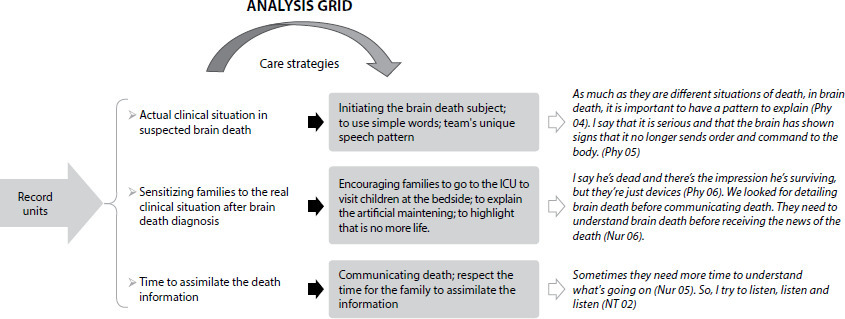
-
ORIGINAL ARTICLE09-23-2022
Effects of multidisciplinary rounds and checklist in an Intensive Care Unit: a mixed methods study
Revista Brasileira de Enfermagem. 2022;75(3):e20210934
Abstract
ORIGINAL ARTICLEEffects of multidisciplinary rounds and checklist in an Intensive Care Unit: a mixed methods study
Revista Brasileira de Enfermagem. 2022;75(3):e20210934
DOI 10.1590/0034-7167-2021-0934
Views0See moreABSTRACT
Objectives:
to analyze the implementation of multidisciplinary checklist-directed rounds before health indicators and multidisciplinary team perception of an Intensive Care Unit.
Methods:
a mixed methods study, with an explanatory sequential design, carried out at a hospital in southern Brazil, from September 2020 to August 2021. The integration of quantitative and qualitative data was combined by connection.
Results:
after the implementation of checklist-directed rounds, there was a significant reduction in hospital stay from ventilator-associated pneumonia, urinary tract infection and daily invasive device use. The investigated practice is essential for comprehensive care, harm reduction, effective work and critical patient safety.
Conclusions:
the multidisciplinary rounds with checklist use reduced data on health indicators of critically ill patients and was considered a vital practice in the intensive care setting.
-
REFLECTION09-23-2022
Legislation and quality of nursing education in the context of the COVID-19 pandemic
Revista Brasileira de Enfermagem. 2022;75(3):e20210825
Abstract
REFLECTIONLegislation and quality of nursing education in the context of the COVID-19 pandemic
Revista Brasileira de Enfermagem. 2022;75(3):e20210825
DOI 10.1590/0034-7167-2021-0825
Views0See moreABSTRACT
Objectives:
to reflect on the governmental normative acts issued for higher education during the COVID-19 pandemic and on the repercussions of these acts on the quality of nursing education in Brazil.
Methods:
this is a reflection on the repercussions for the quality of nursing education, based on the normative acts applied to higher education, enacted from March to December 2020, available on the Ministry of Education website and in the current literature on the subject anchored in the National Curriculum Guidelines for the Undergraduate Nursing Course.
Results:
educational legislation, in the context of the pandemic, distanced education from the world of work, as well as from the quality of training established in the guidelines.
Final Considerations:
remote teaching in nursing makes it difficult to train professionals with the capacity to effectively teach and learn in the real world of care and health promotion in the Unified Health System.
-
09-19-2022
Subjetivação dos profissionais de saúde no fim da vida e morte no serviço domiciliar
Revista Brasileira de Enfermagem. 2022;75(2):e20210684
Abstract
Subjetivação dos profissionais de saúde no fim da vida e morte no serviço domiciliar
Revista Brasileira de Enfermagem. 2022;75(2):e20210684
DOI 10.1590/0034-7167-2021-0684
Views0See moreRESUMEN
Objetivos:
analizar los modos de subjetivación de los profesionales de la salud hacia el final de la vida y la muerte en un servicio de atención domiciliaria.
Métodos:
investigación cualitativa realizada en un servicio de atención domiciliaria en un hospital escuela en el sur de Brasil, con 12 profesionales de la salud. Para la recolección de datos se utilizó la observación participante y entrevistas semiestructuradas, de abril a septiembre de 2018. Los datos fueron analizados a partir del concepto de poder y subjetivación de Foucault.
Resultados:
los profesionales son sensibilizados por discursos morales, espirituales y de cuidados paliativos, así como por vivencias que los constituyen sujetos que modifican sus modos de vida y ejercicio profesional a partir de la relación con la muerte.
Consideraciones Finales:
la red discursiva de los cuidados paliativos es interiorizada por los profesionales, que realizan sus prácticas con conductas encaminadas a promover “una buena muerte”.
-
ORIGINAL ARTICLE09-19-2022
Colorectal cancer mortality in women: trend analysis in Brazil and its regions and states
Revista Brasileira de Enfermagem. 2022;75(2):e20210751
Abstract
ORIGINAL ARTICLEColorectal cancer mortality in women: trend analysis in Brazil and its regions and states
Revista Brasileira de Enfermagem. 2022;75(2):e20210751
DOI 10.1590/0034-7167-2021-0751
Views0See moreABSTRACT
Objectives:
to analyze colorectal cancer mortality trends in women in Brazil and its regions and states.
Methods:
ecological, time-series study with trend analysis of deaths caused by colorectal cancer in women in Brazil and its regions and states between 2008 and 2019. Polynomial regression was used to treat the data.
Results:
48,225 deaths of women caused by colorectal cancer were examined. There was an increasing mortality trend in Brazilian women, with regional differences that resulted from socioeconomic, political, and cultural inequalities. The South Region stood out with the highest rate (7.32) in 2008, which increased to 8.65 in 2019, followed by the Southeast Region, whose rates were 6.72 and 9.05 in 2008 and 2019, respectively.
Conclusions:
colorectal cancer mortality increased, which indicates the need to expand public policies oriented toward screening and early diagnosis of colorectal cancer in women.
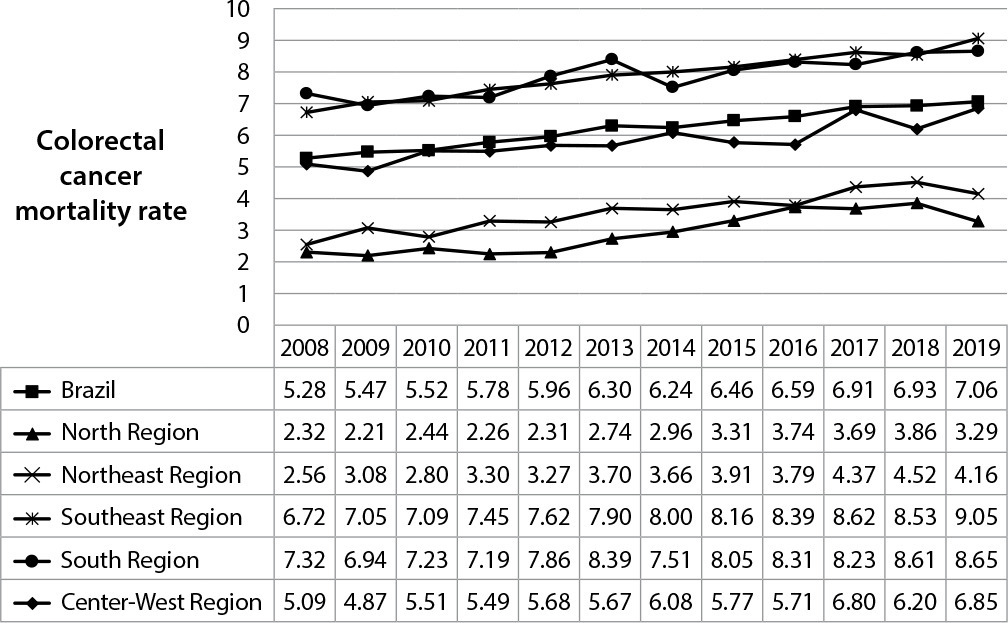
-
ORIGINAL ARTICLE09-19-2022
Health professionals’ subjectivation towards end of life and death in home care service
Revista Brasileira de Enfermagem. 2022;75(2):e20210684
Abstract
ORIGINAL ARTICLEHealth professionals’ subjectivation towards end of life and death in home care service
Revista Brasileira de Enfermagem. 2022;75(2):e20210684
DOI 10.1590/0034-7167-2021-0684
Views0See moreABSTRACT
Objectives:
to analyze the modes of subjectification of health professionals towards end of life and death in a home care service.
Methods:
this is qualitative research carried out in a home care service at a teaching hospital in southern Brazil, with 12 health professionals. Participant observation and semi-structured interviews were used for data collection, from April to September 2018. Data were analyzed based on Foucault’s concept of power and subjectivation.
Results:
professionals are sensitized by moral, spiritual and palliative care discourses, as well as experiences that constitute them subjects who modify their ways of life and professional practice based on the relation with death.
Final Considerations:
the discursive network of palliative care is internalized by professionals, who carry out their practices with behaviors aimed at promoting “a good death”.
-
REVIEW07-29-2022
Technologies used by nursing to predict clinical deterioration in hospitalized adults: a scoping review
Revista Brasileira de Enfermagem. 2022;75(5):e20210570
Abstract
REVIEWTechnologies used by nursing to predict clinical deterioration in hospitalized adults: a scoping review
Revista Brasileira de Enfermagem. 2022;75(5):e20210570
DOI 10.1590/0034-7167-2021-0570
Views1See moreABSTRACT
Objective:
to map the early clinical deterioration technologies used in nurses’ professional practice in the care of hospitalized adult patients.
Methods:
this is a scoping review, according to Joanna Briggs Institute Reviewer’s Manual, which seeks to map the main technologies for detecting early clinical deterioration of hospitalized patients available for use by nurses, summarizing them and indicating gaps in knowledge to be investigated.
Results:
twenty-seven studies were found. The most present variables in the technologies were vital signs, urinary output, awareness and risk scales, clinical examination and nurses’ judgment. The main outcomes were activation of rapid response teams, death, cardiac arrest and admission to critical care units.
Final considerations:
the study emphasizes the most accurate variables in patient clinical assessment, so that indicative signs of potential severity can be prioritized to guide health conducts aiming to intervene early in the face of ongoing clinical deterioration.
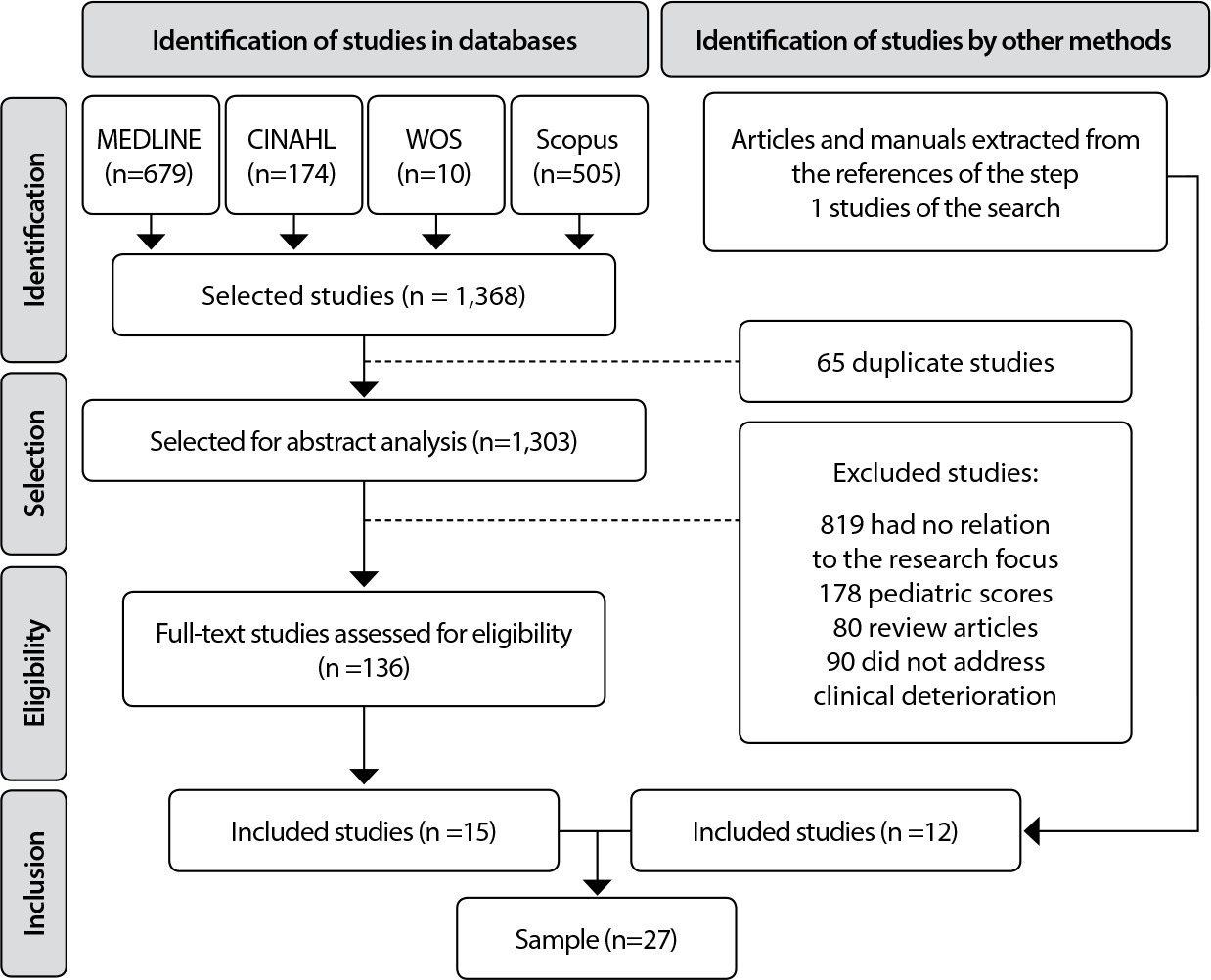
-
ORIGINAL ARTICLE05-09-2022
Core competencies for the training of advanced practice nurses in oncology: a Delphi study
Revista Brasileira de Enfermagem. 2022;75(5):e20210573
Abstract
ORIGINAL ARTICLECore competencies for the training of advanced practice nurses in oncology: a Delphi study
Revista Brasileira de Enfermagem. 2022;75(5):e20210573
DOI 10.1590/0034-7167-2021-0573
Views0See moreABSTRACT
Objective:
To map out and validate the core competencies for the training of advanced practice nurses in oncology.
Methods:
Exploratory-descriptive research with a quantitative approach using the Delphi technique. Initially, a matrix composed of six domains outlining 112 core competencies of the clinical nurse specialist in oncology was elaborated. The Likert scale was used to measure the degree of agreement. Data collection took place through the Google Forms® platform from February to May 2021. Data were compiled and analyzed based on expert suggestions and literature.
Results:
100 competencies achieved consensus (agreement level above 85.7%) in the first round; 13 new competencies were proposed by expert members; and 125 were validated during the Delphi technique.
Conclusion:
The mapping and validation of core competencies will allow the development of new training models aimed at advanced practice in oncology and future educational harmonization.
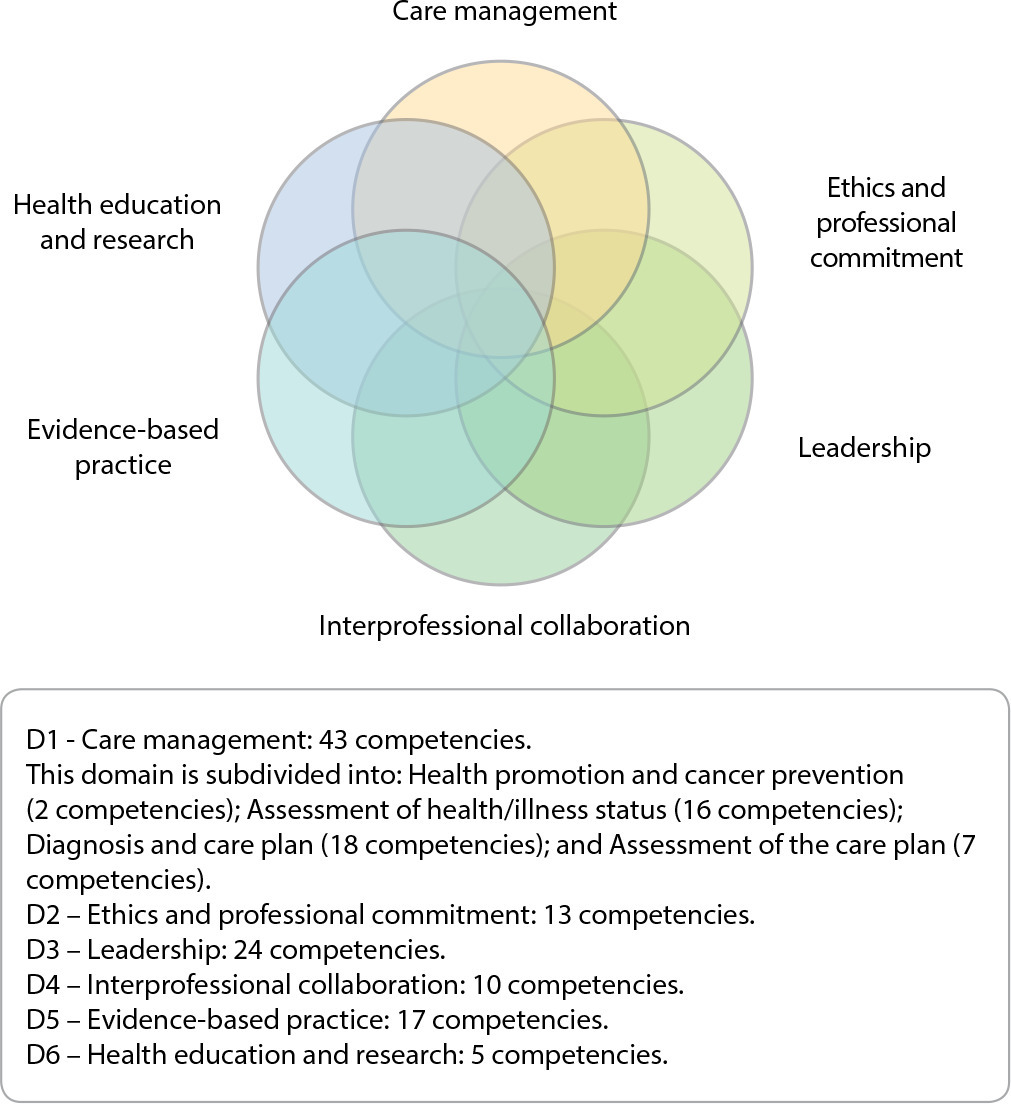
-
ORIGINAL ARTICLE10-21-2022
Technology for nursing consultation with transsexual women in the light of Leininger’s transcultural theory
Revista Brasileira de Enfermagem. 2022;75(5):e20210769
Abstract
ORIGINAL ARTICLETechnology for nursing consultation with transsexual women in the light of Leininger’s transcultural theory
Revista Brasileira de Enfermagem. 2022;75(5):e20210769
DOI 10.1590/0034-7167-2021-0769
Views0See moreABSTRACT
Objective:
to describe the construction and validation of a nursing consultation technology for transgender women.
Methods:
a methodological study developed in three stages with construction based on the Leininger’s Cross-Cultural Theory, content validation performed by experts in transgender sexual health and evaluation by nurses of care for transgender women. Items with a minimum agreement of 80% were considered validated, according to the Content Validity Index and binomial test.
Results:
the technology contains 59 items in three blocks: the first, for identification of the transsexual woman; the second, with the Clinical Data; and the third, regarding the Propaedeutics of Care. All items reached agreement higher than 0.8 and an overall Validity Index of 80%.
Conclusions:
the technology was content-validated and evaluated by nurses and can be applicable in clinical and outpatient practice as well as in academia to promote quality care for transgender women.
-
ORIGINAL ARTICLE07-22-2022
Cross-cultural adaptation, validation and reliability of the Medication Safety Thermometer tool for use in Brazil
Revista Brasileira de Enfermagem. 2022;75(5):e20210839
Abstract
ORIGINAL ARTICLECross-cultural adaptation, validation and reliability of the Medication Safety Thermometer tool for use in Brazil
Revista Brasileira de Enfermagem. 2022;75(5):e20210839
DOI 10.1590/0034-7167-2021-0839
Views0See moreABSTRACT
Objectives:
to perform cross-cultural adaptation, face and content validation and reliability analysis of the Medication Safety Thermometer tool for use in Brazil.
Methods:
the process of cross-cultural adaptation and validation followed the stages of translation, synthesis of translations, back-translation, content validation performed by experts, and face validation through pre-testing. Reliability was determined by calculating the Kappa coefficient.
Results:
the two translated versions were synthesized into a single version, which was back-translated and showed no divergences. The expert committee judged the adapted tool as equivalent, reaching a Content Validity Index higher than 0.8. The mean global understanding was 1.82, demonstrating face validity. The assessed items had Kappa coefficient greater than 0.61, showing agreement between observers.
Conclusions:
the cross-cultural adaptation of the tool was performed following an established methodology. The adapted tool showed inter-rater reliability and validity for use in Brazil.
-
ORIGINAL ARTICLE08-15-2022
Construction and validation of an educational video for patients in the perioperative period of robotic surgery
Revista Brasileira de Enfermagem. 2022;75(5):e20210952
Abstract
ORIGINAL ARTICLEConstruction and validation of an educational video for patients in the perioperative period of robotic surgery
Revista Brasileira de Enfermagem. 2022;75(5):e20210952
DOI 10.1590/0034-7167-2021-0952
Views1See moreABSTRACT
Objectives:
to build and validate educational technology, of the video type, aimed at teaching about the perioperative period of robotic surgery.
Methods:
methodological development study, following the integrative review phases: pre-production, production, post-production, and validation. The video was evaluated for content and appearance by 14 judges. Content validity (CVI) and appearance (AVI) and agreement (CI) indices were calculated, and the exact binomial test was applied, considering p>0.05 and a proportion of 0.80 of agreement.
Results:
the video included 13 themes, with a duration of seven minutes and 33 seconds. The items of the three dimensions evaluated presented excellent CVI, ranging between 0.86 and 1.00 (p>0.05), with a total CVI of 0.95, VAT of 0.94 and CI equal to 61.5%.
Conclusions:
the video included 13 themes, with a duration of seven minutes and 33 seconds. The items of the three dimensions evaluated presented excellent CVI, ranging between 0.86 and 1.00 (p>0.05), with a total CVI of 0.95, VAT of 0.94 and CI equal to 61.5%.
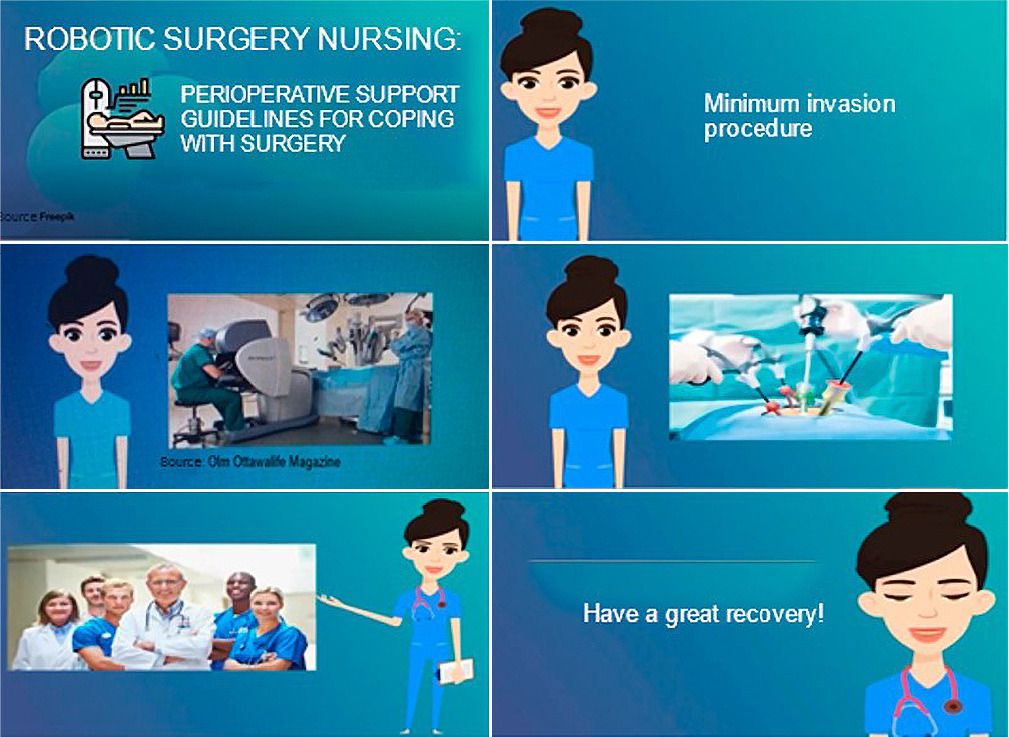
-
ORIGINAL ARTICLE09-26-2022
Educational technology for infants’ families to identify warning signs: a validation study
Revista Brasileira de Enfermagem. 2022;75(5):e20210964
Abstract
ORIGINAL ARTICLEEducational technology for infants’ families to identify warning signs: a validation study
Revista Brasileira de Enfermagem. 2022;75(5):e20210964
DOI 10.1590/0034-7167-2021-0964
Views0See moreABSTRACT
Objective:
To validate, with the target audience, the usability and appearance of a serialized album about the warning signs to the health of children below 2 months.
Method:
Methodological validation study with the target population of an educational material in the form of a serialized album. 11 mothers with children under 2 months of age participated. The domains evaluated were: Objectives, Organization, Writing Style, Appearance, and Motivation. Data were analyzed using descriptive and statistics, and the data agreement index was calculated.
Results:
The global data agreement index was high (0.99). Mothers had positive responses, recognizing the excellence of the material: attractive figures that were easy to understand.
Conclusion:
The validation of the serialized album provides mothers with the abilities and knowledge they need to identify warning signs in regard to the health of their children, providing them with autonomy, corresponsibility, and helping them develop better child health practices.
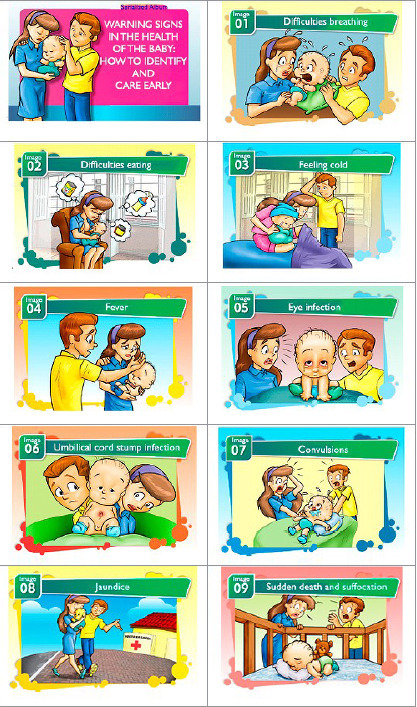
-
ORIGINAL ARTICLE10-17-2022
Validation of the Brazilian Portuguese version of the Venous International Assessment Scale and proposal of revision
Revista Brasileira de Enfermagem. 2022;75(5):e20220100
Abstract
ORIGINAL ARTICLEValidation of the Brazilian Portuguese version of the Venous International Assessment Scale and proposal of revision
Revista Brasileira de Enfermagem. 2022;75(5):e20220100
DOI 10.1590/0034-7167-2022-0100
Views0See moreABSTRACT
Objective:
To validate the Brazilian Portuguese translation and analyze the cultural adaptation of the Venous International Assessment Scale.
Methods:
Observational study by employing the Delphi technique and an equivalence evaluation by experts. The results were analyzed using item scores and by content validity index calculations of item, scale, and universal agreement.
Results:
Three rounds of evaluation were necessary for consensus. Explanatory contents were incorporated into the original scale throughout the process, resulting in a new version: VIA Scale – Revised. This scale obtained a content validity index of 0.96 and a universal agreement of 0.78. In the cross-cultural adequacy analysis phase, a score of 0.77 was obtained. The majority (90.5%) of the participants judged the scale’s decision support property as positive.
Conclusion:
The VIA Scale was validated and culturally adapted to the Brazilian Portuguese language, resulting in the VIA Scale – Revised (VIA-R).
-
ORIGINAL ARTICLE07-29-2022
Effects of guided imagery relaxation in hematopoietic stem-cell transplantation patients: a quasi-experimental study
Revista Brasileira de Enfermagem. 2022;75(5):e20220114
Abstract
ORIGINAL ARTICLEEffects of guided imagery relaxation in hematopoietic stem-cell transplantation patients: a quasi-experimental study
Revista Brasileira de Enfermagem. 2022;75(5):e20220114
DOI 10.1590/0034-7167-2022-0114
Views1See moreABSTRACT
Objective:
To analyze the effects of the technique of virtual reality guided imagery in the vital signs of hematopoietic stem-cell transplantation patients.
Method:
Quasi-experimental study with 35 participants who received an intervention using virtual reality guided imagery with progressive muscle relaxation, applied three times a week for four weeks in a referral hospital for transplants in the south of Brazil. Data collected included: temperature, arterial pressure, respiratory rate, heart rate, pain, and oxygen saturation, before and after each intervention. The comparisons were analyzed using Wilcoxon’s test.
Results:
There was a clinical significance between the mean measurements before and after for respiratory rate (p=0.00) in all stages, and for the variables Heart rate, Temperature, and Oxygen saturation from the 1st to the 12th measurements (p=0.05).
Conclusion:
The intervention was low cost, easy to apply, and showed positive effects, presenting itself as an option for patient-focused care.
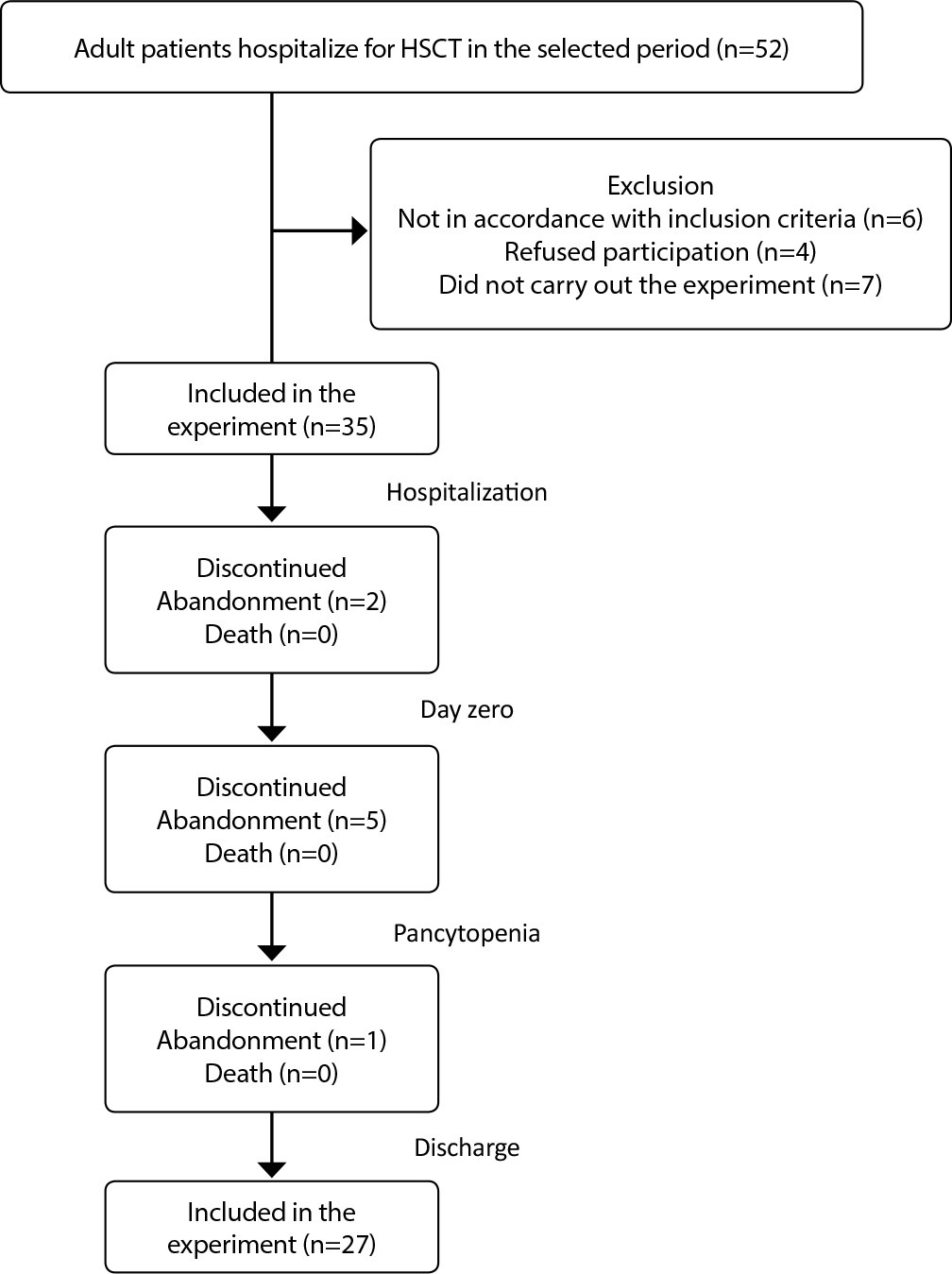
-
ORIGINAL ARTICLE12-05-2019
Aging, sexuality and nursing care: the elderly woman’s look
Revista Brasileira de Enfermagem. 2019;72:71-78
Abstract
ORIGINAL ARTICLEAging, sexuality and nursing care: the elderly woman’s look
Revista Brasileira de Enfermagem. 2019;72:71-78
DOI 10.1590/0034-7167-2018-0015
Views0See moreABSTRACT
Objective:
to analyze the perception of elderly women about sexuality and practice of nursing care in this context.
Method:
a descriptive qualitative study. Fifty elderly women from Guanambi City – Bahia State were interviewed in 2016. Data collection technique was direct interview by using an unstructured script. Analysis of the semantic content described was carried out, and two empirical categories: the elderly woman’s view of nursing care in the promotion of sexual health and experience of sexuality in the elderly; and nursing care in the context of women’s aging.
Results:
it has been noted that the elderly women are afraid to talk about sexuality, especially with health professionals. By influences of society, they often exclude this issue of health care for elderly women.
Final considerations:
changes must be thought about assistance provided in relation to sexuality.
-
ORIGINAL ARTICLE12-05-2019
Construction and validation of a sleep hygiene booklet for the elderly
Revista Brasileira de Enfermagem. 2019;72:214-220
Abstract
ORIGINAL ARTICLEConstruction and validation of a sleep hygiene booklet for the elderly
Revista Brasileira de Enfermagem. 2019;72:214-220
DOI 10.1590/0034-7167-2018-0603
Views0See moreABSTRACT
Objective:
to construct and validate an educational booklet for the elderly, with guidelines on sleep hygiene.
Method:
a methodological research with booklet construction; validation by 22 judges and evaluation by 22 elderly people. The content was extracted from the guidelines of the Brazilian Sleep Association and the elderly health manual of the Human Rights Office. The item with Content Validity Index (CVI) greater than 0.8 or whose concordance ratio verified with the Binomial Test was valid and statistically equal to or greater than 80%.
Results:
the booklet presented 14 guidelines for the elderly about sleep hygiene distributed over 25 pages. All items were evaluated as relevant. The CVI had an average of 0.95 by the judges and 0.95 by the elderly.
Conclusion:
the booklet was constructed and validated as to its content and appearance. It can be used by health professionals in the various services with the elderly.

-
ORIGINAL ARTICLE05-18-2020
Authentic leadership among nursing professionals: knowledge and profile
Revista Brasileira de Enfermagem. 2020;73(4):e20180888
Abstract
ORIGINAL ARTICLEAuthentic leadership among nursing professionals: knowledge and profile
Revista Brasileira de Enfermagem. 2020;73(4):e20180888
DOI 10.1590/0034-7167-2018-0888
Views0See moreABSTRACT
Objectives:
to identify the knowledge of nursing professionals about leadership models and evaluate the authentic leadership profile among them.
Methods:
analytical study, conducted between August and December 2015, involving 84 nursing professionals working in a public and tertiary hospital. We used two instruments: Sociodemographic Questionnaire with questions about leadership and the Authentic Leadership Questionnaire.
Results:
both nurses and nursing technicians were unaware of authentic leadership. Both pointed to communication, planning, and organization as competencies of the leader (n = 58, 95%). Regarding the authentic leadership profile, we observed that the score was “high” among nurses and “low” among technicians. Holding a leadership position and professionally upgrading has positively influenced the highest-profile of authentic leadership.
Conclusions:
nurses demonstrated to know behavioral leadership, while nursing technicians showed knowledge about situational leadership. Nurses had a high score of authentic leadership behaviors, while nursing technicians had a low score, but we found no significant difference between them. Holding a leadership position and professionally upgrading has positively influenced the highest profile of authentic leadership.
-
ORIGINAL ARTICLE09-29-2022
Relationship between family functionality and the quality of life of the elderly
Revista Brasileira de Enfermagem. 2022;75(2):e20210106
Abstract
ORIGINAL ARTICLERelationship between family functionality and the quality of life of the elderly
Revista Brasileira de Enfermagem. 2022;75(2):e20210106
DOI 10.1590/0034-7167-2021-0106
Views0See moreABSTRACT
Objective:
To analyze the correlation between family functionality and the quality of life of the elderly.
Method:
Sectional and correlational study conducted with 692 Brazilian elderly between July and October 2020. The elderly filled three instruments: biosociodemographic, family APGAR and WHOQOL-Old. The tests Kruskal-Wallis, Pearson correlation, and linear regression analyzed the data. The study considered a 95% confidence interval (p < 0.05) for all analyses.
Results:
The elderly with mild and severe family dysfunction presented worse quality of life when compared to the elderly with a functional family. All facets of quality of life correlated positively with family functionality.
Conclusion:
Family functionality is positively correlated with the quality of life of the elderly, therefore requiring the inclusion of the family in health care plans to identify potential family stressors early and plan interventions to solve the problems raised.
-
ORIGINAL ARTICLE12-13-2019
Prenatal follow-up of high-risk pregnancy in the public service
Revista Brasileira de Enfermagem. 2019;72:204-211
Abstract
ORIGINAL ARTICLEPrenatal follow-up of high-risk pregnancy in the public service
Revista Brasileira de Enfermagem. 2019;72:204-211
DOI 10.1590/0034-7167-2018-0425
Views0See moreABSTRACT
Objective:
to analyze the prenatal follow-up of high-risk pregnancy in the public service.
Method:
an analytical cross-sectional study carried out in a public maternity hospital in the South of Brazil, during the hospitalization of 319 postpartum women using a semi-structured tool for transcription of the prenatal card records and interview. The data were analyzed using the Chi-Square test (p≤0.05).
Results:
the adequacy of prenatal care was high (74%); 22.6% intermediate; 3.4% inefficient. Prenatal care had high coverage (100%), early onset (81.5%) and six or more visits (92.4%), but (77.4%) did not receive information about gestational disease and examinations (69.3%). There was statistical significance between the quality of prenatal care and the place of prenatal care (p=0.005).
Conclusion:
the need to implement a specific protocol for high-risk gestation and continuous education to the teams was evidenced.

-
ORIGINAL ARTICLE12-05-2019
Spirituality and religiosity for the transcendence of the elderly being
Revista Brasileira de Enfermagem. 2019;72:259-265
Abstract
ORIGINAL ARTICLESpirituality and religiosity for the transcendence of the elderly being
Revista Brasileira de Enfermagem. 2019;72:259-265
DOI 10.1590/0034-7167-2018-0840
Views0See moreABSTRACT
Objective:
to understand the life experiences that favor transcendence of the elderly being.
Method:
a qualitative phenomenological hermeneutic study, in two groups of elderly coexistence. The selection of participants was by intentional sampling: 11 elderly, achieving theoretical saturation. Data collection was carried out through a phenomenological interview with a detonating question. Ethical principles of the General Health Law in health research were fulfilled. Analysis with Heideggerian hermeneutic circle was performed.
Results:
unity of meaning on the consciousness of a higher power for transcendence is highlighted, where spirituality and religiosity are resources of the elderly for strength, feel protected, overcome difficult situations and reach fullness; both favor the understanding of their historicity by manifesting enlightenment.
Final considerations:
transcendence of the elderly being is favored with spirituality and the experiences of their daily life are imbued with a spiritual and religious relationship that give meaning to their existence.
-
ORIGINAL ARTICLE06-24-2020
Serious Game e-Baby Família: an educational technology for premature infant care
Revista Brasileira de Enfermagem. 2020;73(4):e20190116
Abstract
ORIGINAL ARTICLESerious Game e-Baby Família: an educational technology for premature infant care
Revista Brasileira de Enfermagem. 2020;73(4):e20190116
DOI 10.1590/0034-7167-2019-0116
Views0See moreABSTRACT
Objectives:
to develop and assess the serious game e-Baby Família with parents of premature infants.
Methods:
a methodological study regarding the development of the serious game, with participatory design in scope definition, starting from parents’ learning needs about premature infant care. A qualitative approach was performed in the assessment stage with parents, with content analysis of the speech of the eight participants.
Results:
the following categories emerged: Realistic appearance of the virtual setting and game content and Gameplay implications for the use of e-Baby Família. The game was satisfactorily assessed regarding content, appearance and dynamics use, motivating participants to learn.
Final Considerations:
in the context of prematurity as a public health problem in Brazil and the need to strengthen family health education for care, the serious game was assessed as motivating and appropriate for health learning.

-
03-15-2021
Effectiveness of mobile applications in pregnant women’s adherence to prenatal consultations: randomized clinical trial
Revista Brasileira de Enfermagem. 2021;74:e20190599
Abstract
Effectiveness of mobile applications in pregnant women’s adherence to prenatal consultations: randomized clinical trial
Revista Brasileira de Enfermagem. 2021;74:e20190599
DOI 10.1590/0034-7167-2019-0599
Views0See moreABSTRACT
Objective:
to evaluate the effectiveness of a mobile application for cell phones in the adherence of pregnant women to prenatal consultations.
Method:
a randomized controlled clinical trial, simple-blind with two parallel groups, conducted from January to December 2018. Data collection was carried out through a structured interview at the end of the third trimester of pregnancy. For analysis, Chi-Square and Mann-Whitney tests were used. The sample consisted of 88 pregnant women from 2 Family Health Strategies in Northeast Brazil. Participants were randomized into two groups: intervention (IG), who used the application, and control (CG), who attended prenatal consultations.
Results:
pregnant women who used the application (IG) attended a greater number of consultations when compared to participants in the CG, identifying a statistical difference between the groups (p<0.05).
Conclusion:
the application showed to be an effective health technology to improve adherence to prenatal care. Brazilian Registry of Clinical Trials: RBR-74SNST.

Search
Search in:
Nuvem de Tags
Adolescente (85) Atenção Primária à Saúde (239) COVID-19 (91) Criança (91) Cuidados de Enfermagem (269) Educação em Enfermagem (151) Educação em Saúde (139) Enfermagem (930) Enfermagem Pediátrica (86) Estudantes de Enfermagem (77) Estudos de Validação (131) Família (87) Idoso (208) Promoção da Saúde (99) Qualidade de Vida (104) Saúde do Trabalhador (86) Saúde Mental (145) Saúde Pública (82) Segurança do Paciente (150) Tecnologia Educacional (100)



